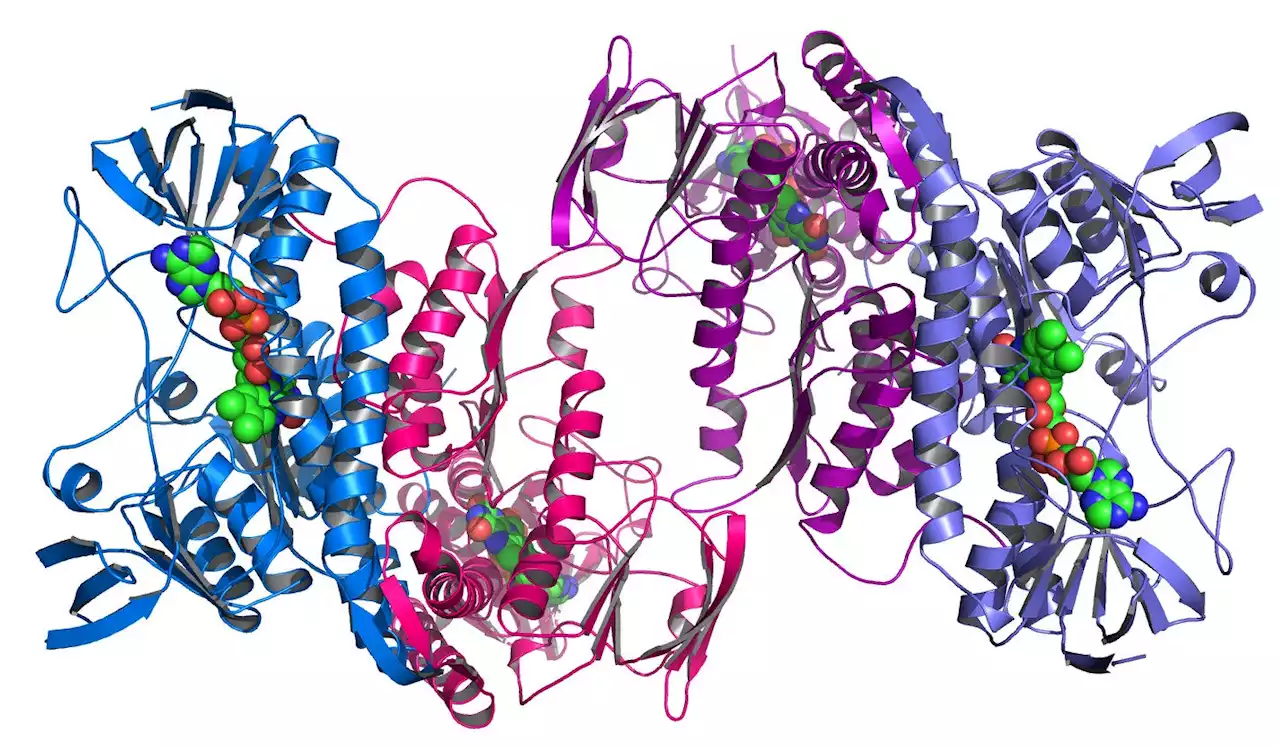It is using language learning models to predict how proteins fold.
First, to contextualize the importance of understanding protein shapes, here’s a brief biology lesson. Certainof nucleotides from genes are translated by a molecule in the cell called a ribosome into amino acids. Proteins are chains of amino acids that have assorted themselves into unique forms and configurations. An emerging field of science called metagenomics is using gene sequencing to discover, catalog, and annotate new proteins in the natural world.
Historically, computational biologists have used evolutionary patterns to predict the structures of proteins. Proteins, before they’re folded, are linear strands of amino acids. When the protein folds into complex structures, certain sequences that may appear far apart in the linear strand could suddenly be very close to one another.“You can think about this as two pieces in a puzzle where they have to fit together.
“What’s different about our approach is that we’re making the prediction directly from the amino acid sequence, rather than making it from this set of multiple related proteins and looking at the patterns,” Rives says. “The language model has learned these patterns in a different way. What this means is that we can greatly simplify the structure prediction architecture because we don’t need to process this set of sequences and we don’t need to search for related sequences.
How did they train this model to be able to do this task? It took two steps. First, they had to pre-train the language model across a large number of proteins that have different structures, come from different protein families, and are taken all across the evolutionary timeline. They used a version of the, where they blanked out portions of the amino acid sequence and asked the algorithm to fill in those blanks.
United States Latest News, United States Headlines
Similar News:You can also read news stories similar to this one that we have collected from other news sources.
 Meta Unveils Inaugural Class of ‘Creators of Tomorrow’ with Drew Afualo, Sydney Bell and MoreMeta is kicking off its second annual Creator Week with a new program celebrating emerging digital influencers. Their inaugural class of Creators of Tomorrow highlights 25 up-and-coming creatives a…
Meta Unveils Inaugural Class of ‘Creators of Tomorrow’ with Drew Afualo, Sydney Bell and MoreMeta is kicking off its second annual Creator Week with a new program celebrating emerging digital influencers. Their inaugural class of Creators of Tomorrow highlights 25 up-and-coming creatives a…
Read more »
 Meta Quest Pro review: A next-gen headset for the VR faithful | EngadgetMeta's new Quest Pro headset represents a big jump up in hardware compared to the Quest 2, but its $1,500 price tag and limited slate of optimized apps at launch make it a tough sell for anyone who isn't a die-hard VR advocate..
Meta Quest Pro review: A next-gen headset for the VR faithful | EngadgetMeta's new Quest Pro headset represents a big jump up in hardware compared to the Quest 2, but its $1,500 price tag and limited slate of optimized apps at launch make it a tough sell for anyone who isn't a die-hard VR advocate..
Read more »
 Meta develops a new way for people to connect through language using AIThe artificial intelligence speech translation system can decipher Hokkien, a spoken language, and hopes to one day translate other spoken languages.
Meta develops a new way for people to connect through language using AIThe artificial intelligence speech translation system can decipher Hokkien, a spoken language, and hopes to one day translate other spoken languages.
Read more »
 Facebook became Meta one year ago: Here's what it’s achievedFacebook was rebranded as Meta on Oct. 28, 2021 to reflect its ambitions to adopt Web3 tech and enter the Metaverse, the company has since unveiled several crypto-related services for users.
Facebook became Meta one year ago: Here's what it’s achievedFacebook was rebranded as Meta on Oct. 28, 2021 to reflect its ambitions to adopt Web3 tech and enter the Metaverse, the company has since unveiled several crypto-related services for users.
Read more »
 Apple, more than Meta, holds the key to unlocking a ‘metaverse’-type world of AROPINION: Metaverse and augmented reality opportunities will eventually materialize. But while Meta may be making all the noise at the moment, it’s Apple that holds the key to the augmented reality future.
Apple, more than Meta, holds the key to unlocking a ‘metaverse’-type world of AROPINION: Metaverse and augmented reality opportunities will eventually materialize. But while Meta may be making all the noise at the moment, it’s Apple that holds the key to the augmented reality future.
Read more »
 Some Quest Pro early adopters are shipping it back to Meta | Digital TrendsThe Meta QuestPro might prove to be a love-it-or-hate-it VRheadset as some early adopters have been disappointed enough to ship it back for a refund.
Some Quest Pro early adopters are shipping it back to Meta | Digital TrendsThe Meta QuestPro might prove to be a love-it-or-hate-it VRheadset as some early adopters have been disappointed enough to ship it back for a refund.
Read more »
